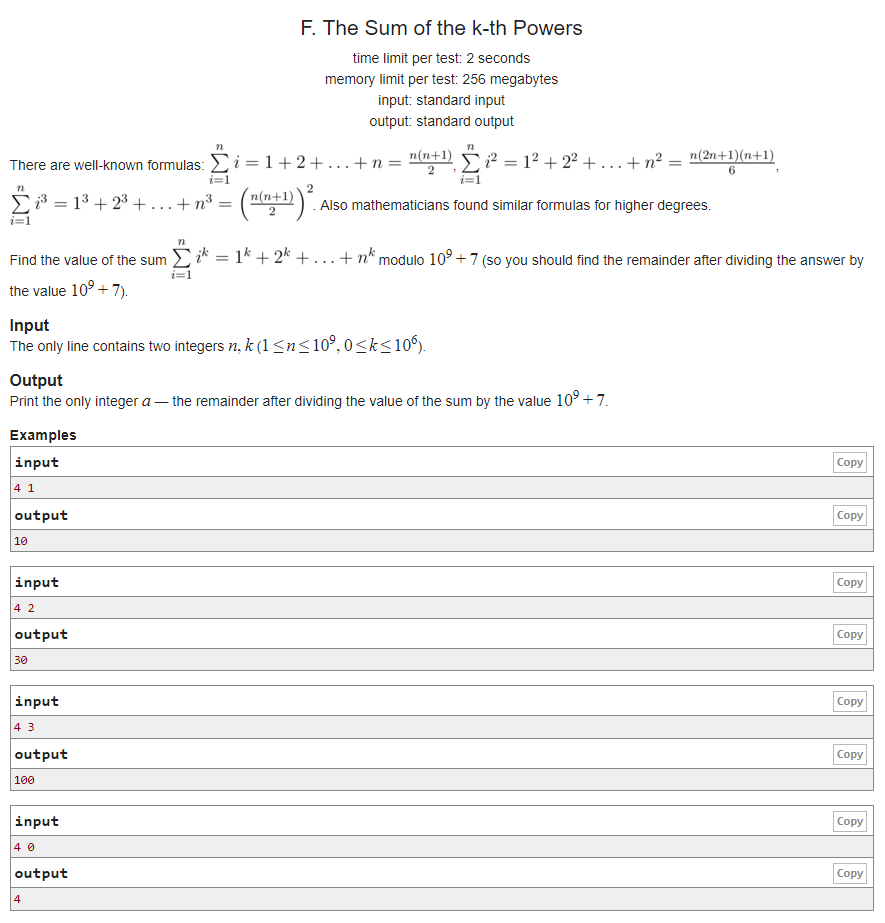The Sum of the k-th Powers(Educational Codeforces Round 7F+拉格朗日插值法)
题目链接
题面

题意
给你\(n,k\),要你求\(\sum\limits_{i=1}^{n}i^k\)的值。
思路
根据数学知识或者说题目提示可知\(\sum\limits_{i=1}^{n}i^k\)可以被一个\(k+1\)次多项式表示。
由拉格朗日插值法(推荐学习博客)的公式:\(L(x)=l(x)\sum\limits_{i=1}^{k+2}y_i\frac{w_i}{x-x_i},\text{其中}l(x)=\prod\limits_{i=1}^{k+2}(x-i),y_i=\sum\limits_{j=1}^{i}j^k,w_i=\prod\limits_{j=1,j\not= i}^{n}\frac{1}{x_i-x_j}\)可以得到结果。
由于本题的特殊性,可以将\(w_i\)进行化简:
\[\begin{aligned}
w_i&=\prod\limits_{j=1,j\not= i}^{n}\frac{1}{x_i-x_j}&\\
&=\prod\limits_{j=1,j\not= i}^{n}\frac{1}{i-j}&\\
&=\frac{1}{(i-1)(i-2)*\dots*1*(i-(i+1))\dots(i-(k+2))}&\\
&=(-1)^{k+2-i}\frac{1}{(i-1)!(k+2-i)!}&
\end{aligned}
\]
因此我们可以通过\(O(k+2)\)的复杂度得到\(l(x),y_i,x-x_i\),然后通过预处理阶乘的逆元我们可以\(O((k+2)log(k+2))\)得到\(w_i\),所以总复杂度为在\(O((k+2)log(k+2)+(k+2))\)左右。
代码实现如下
#include <set>
#include <map>
#include <deque>
#include <queue>
#include <stack>
#include <cmath>
#include <ctime>
#include <bitset>
#include <cstdio>
#include <string>
#include <vector>
#include <cstdlib>
#include <cstring>
#include <iostream>
#include <algorithm>
using namespace std;
typedef long long LL;
typedef pair<LL, LL> pLL;
typedef pair<LL, int> pLi;
typedef pair<int, LL> pil;;
typedef pair<int, int> pii;
typedef unsigned long long uLL;
#define lson rt<<1
#define rson rt<<1|1
#define lowbit(x) x&(-x)
#define name2str(name) (#name)
#define bug printf("*********\n")
#define debug(x) cout<<#x"=["<<x<<"]" <<endl
#define FIN freopen("D://Code//in.txt","r",stdin)
#define IO ios::sync_with_stdio(false),cin.tie(0)
const double eps = 1e-8;
const int mod = 1000000007;
const int maxn = 1e6 + 7;
const double pi = acos(-1);
const int inf = 0x3f3f3f3f;
const LL INF = 0x3f3f3f3f3f3f3f3fLL;
int n, k, pp;
int A[maxn], y[maxn], inv[maxn], w[maxn];
int qpow(int x, int n) {
int res = 1;
while(n) {
if(n & 1) res = 1LL * res * x % mod;
x = 1LL * x * x % mod;
n >>= 1;
}
return res;
}
void init() {
A[0] = pp = 1;
for(int i = 1; i <= min(n, k + 2); ++i) {
A[i] = 1LL * A[i-1] * i % mod;
inv[i] = qpow(n - i, mod - 2);
pp = (1LL * pp * (n - i) % mod + mod) % mod;
y[i] = (y[i-1] + qpow(i, k)) % mod;
}
for(int i = 1; i <= min(n, k + 2); ++i) {
w[i] = 1LL * A[i-1] * A[k+2-i] % mod;
if((k + 2 - i) & 1) w[i] = mod - w[i];
w[i] = qpow(w[i], mod - 2);
}
}
int main() {
scanf("%d%d", &n, &k);
init();
if(n <= k + 2) return printf("%d\n", y[n]) * 0;
int ans = 0;
for(int i = 1; i <= (k + 2); ++i) {
ans = (ans + 1LL * pp * y[i] % mod * w[i] % mod * inv[i] % mod) % mod;
}
printf("%d\n", ans);
return 0;
}
版权声明:本文允许转载,转载时请注明原博客链接,谢谢~


